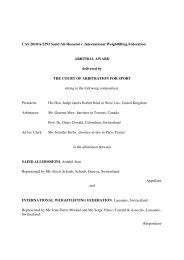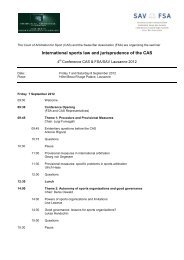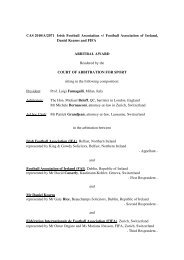(CAS) Bulletin - Tribunal Arbitral du Sport / TAS
(CAS) Bulletin - Tribunal Arbitral du Sport / TAS
(CAS) Bulletin - Tribunal Arbitral du Sport / TAS
Create successful ePaper yourself
Turn your PDF publications into a flip-book with our unique Google optimized e-Paper software.
troubling because . . . United States Courts have no power to<br />
right the wrong perpetrated upon one of its citizens,” the court<br />
observed that Gatlin’s only judicial recourse was to<br />
request that the Swiss Federal <strong>Tribunal</strong> vacate the<br />
<strong>CAS</strong> award 87 .<br />
Gatlin is consistent with the general refusal of U.S.<br />
courts to review the merits of claims resolved by<br />
arbitration awards 88 . Of interest to comparative<br />
and arbitration law scholars is the apparent confl ict<br />
between U.S. courts and the European Court of<br />
Justice (ECJ) regarding public international law<br />
and its relation to the state, specifi cally whether a<br />
fi nal and binding arbitration award should preclude<br />
judicial reconsideration of the merits of the dispute<br />
it resolves 89 .<br />
In Meca-Medina & Majcen v. Commission of<br />
European Communities, the ECJ allowed two<br />
professional swimmers (a Spaniard and a Slovenian)<br />
to relitigate the merits of their claim that the<br />
Fédération Internationale de Natation (FINA)’s<br />
rule regarding the minimum level of nandrolone<br />
(a banned substance) in one’s system suffi cient to<br />
establish a doping offense violated European Union<br />
law 90 . A <strong>CAS</strong> panel had previously rejected their<br />
contention 91 , but re<strong>du</strong>ced on other grounds the<br />
four-year suspension imposed on both swimmers by<br />
FINA, the Swiss-based IF for swimming, for testing<br />
positive for nandrolone <strong>du</strong>ring the 1999 World Cup<br />
swimming competition in Brazil 92 . Rather than<br />
appealing the <strong>CAS</strong> panel’s award to the SFT, the<br />
swimmers brought separate litigation alleging that<br />
the subject antidoping rule contravened European<br />
Circuit held that a U.S. athlete’s state law claims seeking to relitigate the<br />
same doping dispute issues decided by a valid foreign arbitration award<br />
are barred by the New York Convention. It concluded, “Our judicial<br />
system is not meant to provide a second bite at the apple for those who<br />
have sought adjudication of their disputes in other forums and are not<br />
content with the resolution they have received”. Id. at 591. See Weston,<br />
supra note 37, at 103-04 (“The United States has implicitly assigned the<br />
protection of the rights of its [athletes] to a private international tribunal<br />
seated in a foreign nation.”).<br />
87. Gatlin, 2008 WL 2567657, at *1-2. In April 2009, Gatlin settled his<br />
claims against all defendants (USOC, USA Track and Field, the United<br />
States Anti-doping Agency, and the International Association of<br />
Athletics Federations) on terms that were not publicly disclosed. Gatlin<br />
Settles Suit with USADA, USOC and Others, Universal <strong>Sport</strong>s, Apr. 14,<br />
2009, http:// www.universalsports.com/news/article/newsid=284396.html.<br />
88. Thomas E. CARBONNEAU, The Revolution in Law Through<br />
Arbitration, 56 Clev. St. L. Rev. 233, 239-41 (2008).<br />
89. See MITTEN, supra note 65, at 64-67.<br />
90. Meca-Medina v. Comm’n of European Cmtys., 2006 E.C.R. I-6991.<br />
91. Arbitration <strong>CAS</strong> 99/A/234 and 99/A/235, Meca-Medina & Majcen<br />
v. Fédération Internationale de Natation Amateur (FINA), award of<br />
Feb. 29, 2000, paras. 4.4-.10; see also Arbitration <strong>CAS</strong> 2005/A/951,<br />
Cañas v. ATP Tour, award of May 23, 2007 (concluding that WADA<br />
antidoping rules and sanctions do not violate European law); Massimo<br />
COCCIA, Applicable Law in <strong>CAS</strong> Proceedings: What To Do with EU<br />
Law?, in <strong>Sport</strong> Governance, Football Disputes, Doping and <strong>CAS</strong><br />
Arbitration, supra note 130 (discussing the relationship between <strong>CAS</strong><br />
proceedings and EU law).<br />
92. Arbitration <strong>CAS</strong> 2000/A/270, Meca-Medina & Majcen v. Fédération<br />
Internationale de Natation (FINA), award of May 23, 2001.<br />
Union competition and freedom to provide services<br />
laws.<br />
The ECJ ruled that European Union law applied<br />
because FINA’s doping rules have the requisite effect<br />
on economic activity by regulating professional<br />
swimming. However, it rejected the swimmers’<br />
claims on their merits because they failed to prove<br />
that the rule regarding the minimum level of<br />
nandrolone suffi cient for a doping violation was not<br />
disproportionate to FINA’s legitimate objectives of<br />
ensuring that athletic competitions are con<strong>du</strong>cted<br />
fairly and protecting athletes’ health. However, it is<br />
remarkable that the ECJ did not consider that their<br />
European Union law claims had been expressly<br />
rejected by a prior <strong>CAS</strong> award, which the swimmers<br />
had agreed would be fi nal and binding, or whether<br />
the fact that Switzerland, Spain, and Slovenia are<br />
parties to the New York Convention should preclude<br />
relitigation of their merits. Although the ECJ’s<br />
decision effectively upheld the <strong>CAS</strong> award, Meca-<br />
Medina establishes precedent that permits future<br />
judicial challenges to the merits of <strong>CAS</strong> awards based<br />
on European Union law.<br />
The potential for a <strong>CAS</strong> award to displace otherwise<br />
applicable national laws of an athlete’s home<br />
country is also illustrated by an Australian court’s<br />
decision in Raguz v Sullivan 93 . Citing irregularities<br />
in an Australian NGB’s application of the selection<br />
criteria, the <strong>CAS</strong> ruled that Raguz’s selection for the<br />
Australian Olympic Team should be revoked and that<br />
another competitor should be selected instead. The<br />
New South Wales Court of Appeal rejected Raguz’s<br />
request that it reverse the <strong>CAS</strong> ruling because the<br />
court lacked jurisdiction to do so. Curiously, the court<br />
did not base its ruling on the New York Convention,<br />
to which Australia is a party, or the federal legislation<br />
that implements it 94 . Instead, it relied on nationally<br />
uniform arbitration laws enacted by Australian state<br />
legislatures 95 . Raguz contracted with the Australian<br />
Olympic Committee to resolve any disputes by <strong>CAS</strong><br />
arbitration rather than litigation in an Australian<br />
court, which is permitted by the uniform state<br />
arbitration laws for an arbitration “in a country<br />
other than Australia” 96 . Because the seat of all <strong>CAS</strong><br />
arbitrations is Lausanne, Switzerland, irrespective<br />
of where the arbitration proceeding is con<strong>du</strong>cted,<br />
the court held that state arbitration law precluded it<br />
from considering the merits of Raguz’s claims 97 . The<br />
93. Raguz v Sullivan (2000) 50 NSWLR 236 (Austl.); see also Damian<br />
STURZAKER & Kate GODHARD, The Olympic Legal Legacy, 2 Melb. J.<br />
Int’l L. 241 (2001) (analyzing the Raguz decision).<br />
94. International Arbitration Act 1974 (Cth) (Austl.).<br />
95. Commercial Arbitration Act 1984 (NSW) s 40 (Austl.).<br />
96. International Arbitration Act 1974 (Cth) s 3(1) (Austl.).<br />
97. Raguz v. Sullivan (2000), 50 NSWLR 236, 257 (Austl.).<br />
Articles et commentaires / Articles and commentaries<br />
-<br />
12





